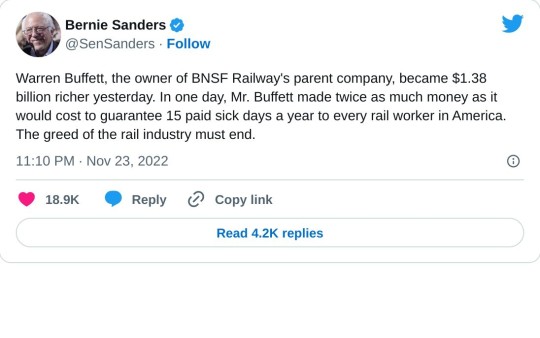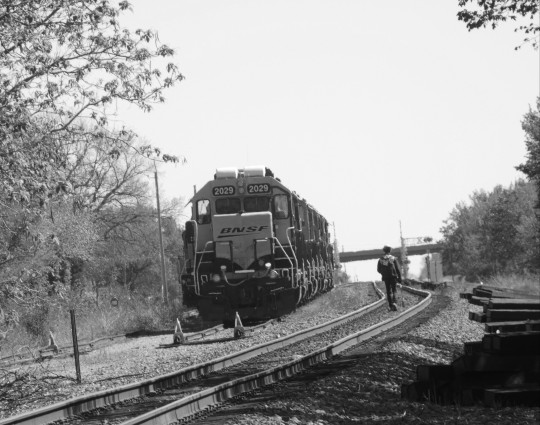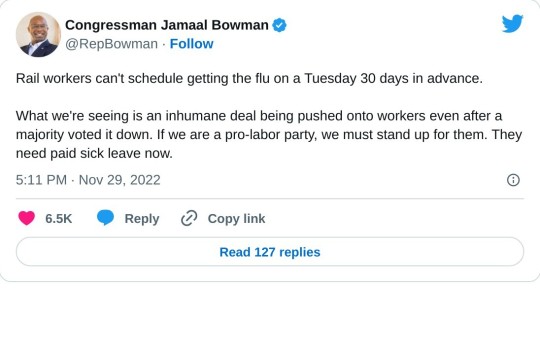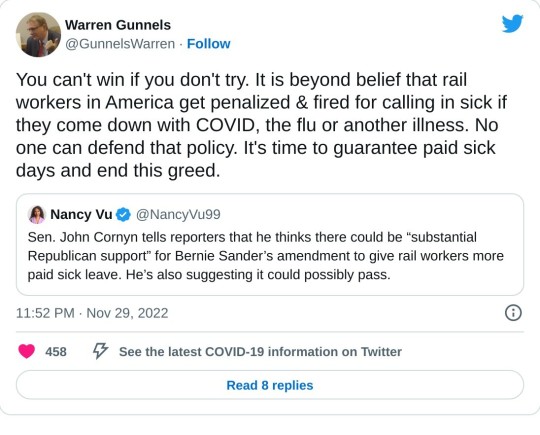#Railway workers
Text

#dirty work#hi vis workwear#hiviz#tradie#workie#boilersuit#dirty jobs#filthy hiviz#gay workers#overalls#hi vis pants#high viz#high vis#hivisibility#hivis#coveralls#dirty boots#rigger boots#work boots#worker wear#workgear#work gear#workwear#worker#gay gear#gay men#dirtyworker#dirty socks#railway workers#chav lads
164 notes
·
View notes
Text
Railway workers: "sick days pls or we'll strike"
CNN: "is a strike worth it? the holidays are just around the corner. think about the economy! now joining us live is the Bank of America CEO to weigh in"
4K notes
·
View notes
Text
The union representing thousands of railroaders has appealed the moves that ended the rail shutdown last week — a work stoppage that halted freight and commuter traffic across the country.
In filings to the Federal Court of Appeal, the Teamsters union challenged directives for binding arbitration issued to a labour board by federal Labour Minister Steven MacKinnon last week, less than a day after the lockout of 9,300 workers by Canadian National Railway Co. and Canadian Pacific Kansas City Ltd.
In response to MacKinnon’s instructions, the Canada Industrial Relations Board ordered the country’s two major railways to resume operations and employees to return to their posts until binding arbitration could produce new contracts.
Continue Reading
Tagging: @newsfromstolenland
40 notes
·
View notes
Text

Railroad workers. Port Barre, Louisiana. 1938
Photo: Russell Lee
26 notes
·
View notes
Text

General strike?
What are we saying the threshold for a general strike is? The famous general strike in 1926 was 1.7 million workers (yes, smaller population, etc etc).
So when can we call it a general strike?
#uk politics#general strike#strike action#civil servants#teachers#university staff#neu#ucu#railway workers#rmt
305 notes
·
View notes
Text

I've been thoroughly enjoying Anthony Dawson tweeting out his journey down the U.K. rail uniforms rabbithole, but this one made me fully scream.
'Undetected Crime Stripes'
76 notes
·
View notes
Text
Earlier this month, a train carrying hazardous chemicals derailed in East Palestine, Ohio, triggering a massive fire and forcing everyone within a 1-mile radius of the crash to evacuate. To avoid a potential explosion, officials conducted a controlled detonation of five tankers three days later, sending carcinogenic vinyl chloride into the air. Two days later, residents of the 4,500-person village were told they could safely return home. Many questioned the safety of the air and water supply.
Since then, reporting has made clear that this environmental disaster was less a freak accident than a predictable outcome of lax safety measures and capitalist greed. Here’s what you need to know about the Norfolk Southern rail company.
NORFOLK SOUTHERN CHOSE NOT TO UPGRADE ITS TRAINS’ “CIVIL WAR-ERA” BRAKES.
A report in The Lever notes that the train that crashed in East Palestine was not equipped with Electronically Controlled Pneumatic brakes—fully electric brakes that experts say could have reduced the severity of the crash. Although Norfolk Southern once touted its use of ECP brakes, it lobbied against requiring them on trains carrying hazardous materials. An Obama-era rule required that HHFTs have ECP brakes, but the Trump administration overturned this rule.
NORFOLK SOUTHERN WORKERS DON’T GET PAID SICK TIME.
Remember when the Senate voted to avert a rail strike and deny workers sick leave? Norfolk Southern workers were among those affected. When investors encouraged Norfolk Southern to offer paid sick leave, the company said, OK, we won’t furlough people as often. Sen. Bernie Sanders (I-VT.) has since demanded that rail companies offer workers at least seven days of paid sick leave.
RAIL COMPANIES REFUSE TO HIRE ENOUGH WORKERS.
Unions say that the rail industry’s use of furloughs to reduce the workforce stretches staff too thin. As Timothy Noah wrote in the New Republic, the 141-car train that crashed in East Palestine carried just two crew members and one trainee:
"On February 10, Anya Litvak of The Pittsburgh Post-Gazette reported that security camera footage 20 miles short of where the derailment occurred showed a rail car axle that appeared to be on fire. Why this information was not transmitted quickly to the train crew remains unknown, but it seems likely that the answer has something to do with the number of people who were in a position to sound the alarm."
NORFOLK SOUTHERN HAS SPENT BILLIONS ON STOCK BUYBACKS.
Norfolk Southern made $4.8 billion in operating profit in 2022, More Perfect Union reported, and paid shareholders $4.7 billion in stock buybacks and dividends.
As my colleague Hannah Levintova explained last year:
"A buyback is when companies purchase shares of their own company from investors, driving up the value of the remaining stock because there are fewer shares circulating. Buybacks are taxed at the lower capital gains rate, which maxes out at 20% for the wealthiest households. But for those investors who don’t sell their shares back to the company, there’s no tax—even though the value of their holdings has increased. Until that investor sells the asset, their wealth will grow tax-free. And thanks in part to a tax code loophole that enables the wealthy to pass shares on to their heirs, who can then skip paying capital gains taxes on them altogether, buybacks play a role in building untaxed generational wealth."
THE TRAIN THAT CAUSED THE CLOUD OF SMOKE OVER EAST PALESTINE WAS NOT CATEGORIZED AS A “HIGH-HAZARD FLAMMABLE TRAIN.”
Thanks to pressure from industry lobbyists, the “high-hazard flammable train” categorization applies only to trains carrying a narrow set of materials, like crude oil, The Lever also reported. That designation would have required that the train follow specific speed and braking restrictions.
DESPITE MAKING BILLIONS IN PROFIT, NORFOLK SOUTHERN INITIALLY OFFERED JUST $25,000 TO EAST PALESTINE.
Norfolk Southern managed to scrape together $25,000 for the town that’s been doused in toxic chemicals. People who fled their homes under fear of death can claim $1,000 per person per household. Since then, the company has announced increases in charity.
#us politics#news#mother jones#2023#east palestine#ohio#norfolk southern#vinyl chloride#carcinogens#Electronically Controlled Pneumatic brakes#railway workers#railroads#railway unions#furloughs#paid sick leave#stock buybacks#high-hazard flammable train#charity#train derailment#hazardous chemical spill#corporate greed
112 notes
·
View notes
Text

#us politics#2022#twitter#tweet#sen. bernie sanders#vermont#railway workers#railroads#railroad strike#railway unions#union workers#worker's rights#worker's union#warren buffett#bnsf railway#eat the rich#eat the fucking rich
175 notes
·
View notes
Text
"The SDPC [Social Democractic Party of Canada] at the Lakehead appears not to have been content merely to contest elections. In 1912, having recently formed a union, the mostly immigrant workers of the Canadian Northern Coal and Ore Dock Company went on strike for better wages, hours, and working conditions. Bloodshed resulted when company officials, using local police and the militia, tried to suppress the striking coal handlers. The chief of police, two constables, and two Italian strikers were wounded. Fearing a general strike, the CNR quickly acquiesced to the demands of the coal handlers.
There was much in this incident that recalled earlier labour strife at the Lakehead. A new element, however, was the growing influence of radical socialists, who were thought to have sway over the coal handlers and to have been instrumental in their inclusion in the trade union movement. Prominent among the activists were “members of the Social Democratic Party of Canada,” including the party’s organizers for Port Arthur and Fort William, the Cobalt miners’ union leader James P. McGuire and the Reverend William Madison Hicks, as well as Herbert Barker, a volunteer organizer for the AFL. In April 1912, the three men led a number of English-speaking socialists in Fort William in establishing Ontario Local 51 of the SDPC. Initial members also included W.J. Carter; an architect named Richard Lockhead; Sid Wilson, a member of the British-based Amalgamated Carpenters; and Fred Moore, owner of the printing press that printed Urry’s The Wage Earner. Significantly, most of the members appear to have been Finnish or Ukrainian.
Before the strike, members of the Fort William SDPC had spoken at meetings of the coal handlers and, in the case of Hicks, played an active role by leading a parade of workers in confronting Port Arthur mayor S.W. Ray on his way to read the Riot Act to the strikers. The meeting between the two men and the violence that ensued were coincidental, according to Morrison, as
the Social Democratic party posed no real or imagined menace to the citizens of Port Arthur … what alarmed the English-speaking community was the newly won influence of the socialists with the immigrant workers.
Supporters of the ILP [Independent Labour Party] of New Ontario such as Urry found themselves “at odds with radical socialism” as
not only had the socialists played a prominent part in the strike,
though not the riot, but they were also attempting to organize Thunder Bay’s entire waterfront.
...
Calls for Hicks’s arrest began to appear in newspapers in both cities and the surrounding countryside. On 1 August 1912, officials arrested him for his role in a “tumultuous assembly … likely to promote a breach of the public peace.” Shortly after Hicks’s arrest and conviction (although he received a suspended sentence), SDPC organizers began an active campaign to take control, or at the very least undermine, the ILP-led Trades and Labour Councils. Following the strike, they sought to stage a general strike on the waterfront and, ideally, spread it throughout both Port Arthur and Fort William. As Jean Morrison writes, however, this was “a move disparaged by the British labour men for its disregard of the law which required negotiations and conciliation preceding strikes by transportation workers.” The attempt failed and widened the rift formed during the municipal, provincial, and federal elections of 1908 and 1911 and the labour unrest earlier in 1912.
...
The SDPC was also not left untouched. In preparation for the 1913 Fort William civic election, Urry and Hicks jointly developed in opposition to the SDPC a manifesto describing the class struggle in general and the issues facing the region’s workers in particular .... On the recommendation of the Elk Lake, Porcupine, and Cobalt locals that Hicks be expelled, the matter was referred to the Fort William membership. Despite facing the possibility that its charter would be revoked, Local 51 refused to expel Hicks and launched a vigorous defence on his behalf. The convincing agitator had a coterie of true believers, who “defended him to the last ditch refusing to believe that Hicks would do anything wrong.” He also had his critics, evidently including the 400-strong Fort William branch, which, it appears, sided with the Dominion Executive and expelled Hicks.
...
With Hicks departed one highly personalized version of a response to the ambiguous legacy of Lakehead socialism. Both the ILP and the SDPC grew rapidly during 1913. The labour councils in the twin cities began to discuss unity, in the form of construction of a joint Central Labour Temple. The Finnish branch of the SDPC in Port Arthur also called out for working-class and socialist unity. Moreover, as a more tangible indication of potential unification of the socialist and labour movements, SDPC organizer Herbert Barker was elected president of the Port Arthur Trades and Labour Council in April 1913.
As so often proved to be the case, however, such incipient unity was challenged by the region’s sheer class volatility. The strike by street railway workers in May 1913 was a volcanic moment. As David Bercuson writes:
The walk-out provided a focal point for much of the hatred and bitterness that had developed between labour and its enemies in the twin cities for several years.
Rioting and violence were sparked by the CPR’s attempts to use strikebreakers. When strikers overturned a streetcar operated by strikebreakers, police arrested one of the participants and, when a crowd tried to get him out of jail, fired into the crowd, killing a bystander. Local newspapers tried to pin the violence on the socialists, who were allegedly responsible for agitating the crowd.
The railway workers belonged to the Trades and Labour Councils in both cities and, in a show of solidarity, both councils called for a general sympathy strike. These calls went unheeded and most workers returned to work after four days of protest. In response, Urry, James Booker, McGuire, Bryan, and many members of the SDPC met at the Finnish Labour Temple. They criticized the local trades and labour councils “for not being radical enough to resist the ruling of an unscrupulous upper class.” They hoped the councils would become “more radical.” Not surprisingly, the obviously inflamed right-wing media in the twin cities characterized the meeting as one of “sedition, anarchy, socialism, violence and most everything else calculated to worry orderly society and responsible government.”
It was not a critique of the Lakehead workers reserved for the mainstream press. Mayor John Oliver of Port Arthur summed up the situation well when he argued that the continued unrest in Port Arthur and Fort William was not wholly due to working conditions. Making specific mention of the strikes of 1909, 1912, and 1913, he suggested that the unrest had been the result of socialist agitators. Oliver wrote:
There is hardly a night in the week that inflammatory speeches have not been made by several agitators … something will have to be done to either remove them or check their actions.
Interestingly, Frederick Urry and J.P. McGuire were specifically named for their alleged advocacy of a general strike. McGuire was further singled out for his reputed suggestion that it would be an easy thing to cut telephone, telegraph, and electric lines."
- Michel S. Beaulieu, Labour at the Lakehead: Ethnicity, Socialism, and Politics, 1900-35. Vancouver: University of British Columbia Press, 2011. p. 37-38, 40-42
#thunder bay#fort william#port arthur#strike#freight handlers#railway workers#immigrant workers#street railways#immigration to canada#canadian socialism#anglo canadians#xenophobia in canada#finnish immigration to canada#ukrainian immigration to canada#coal handlers#northwestern ontario#reading 2024#academic quote#labour at the lakehead#working class history
4 notes
·
View notes
Text
After B*den shut down the railway worker's strike (which--wtf?? how is that a thing), with all of these other unions striking, couldn't they just re-call a strike? Their demands weren't met, and negotiations shut down, so it shouldn't have anything to do with contract-negotiation timing.
#strike#labor rights#worker's right#wga strike#sagaftra strike#sag aftra#sag aftra strike#teamsters strike#ups strike#unions#railway workers#like that would kick ass so hard#all unions need to strike#all workers need unions
14 notes
·
View notes
Text

Railway Worker
#photography#street photography#photographers on tumblr#trains#railway#railway workers#my photography
8 notes
·
View notes
Text
"A rail traffic stoppage could freeze almost 30% of US cargo shipments by weight, stoke inflation & cost the US economy as much as $2B/day"
GOOD
#railway workers#strike#unions#unionize#capitalism#current events#workers#policy#labor#news#america#democracy#revolution
10 notes
·
View notes
Text
The union representing 9,300 workers at Canada’s two biggest railways says public safety is at stake after contract negotiations ground to a halt this month, with a potential strike on the horizon.
Teamsters Canada president François Laporte said demands by Canadian National Railway Co. and Canadian Pacific Kansas City Ltd. are “non-negotiable.”
“CN and CPKC aim to eliminate all safety-critical rest provisions from our collective agreements. These provisions are necessary to combat crew fatigue and ensure public safety,” he said in a press release on Monday.
Full article
Tagging: @politicsofcanada
#cdnpoli#canada#canadian politics#canadian news#canadian#unions#strike#railways#railway workers#safety#workers rights#workers' rights
60 notes
·
View notes
Text

[Image ID: BeauTFC tweeted
If an industry is critical infrastructure and can’t keep its employees working, you don’t penalize the workers, you nationalize the company. ]
9 notes
·
View notes
Text

Its going to be interesting to see if the party of the working people (gag) votes for paid sick days for rail workers.
Spoiler Alert, Republcans voted down paid sick days. 🥴
2 notes
·
View notes
Text
Sen. Bernie Sanders said late Tuesday night that it was time to "put up or shut up" for any U.S. lawmaker who claims to fight for the working class as he and other progressives in Congress vowed to insert paid sick leave into a labor agreement between railway workers and the nation's rail companies.
With a vote in the U.S. House as early as Wednesday morning, Sanders was asked by MSNBC host Chris Hayes whether Congress has the authority to mandate that sick leave—the final key demand of railway workers unions who have battling the carriers for months—be added to the deal that congressional lawmakers have been asked by President Joe Biden to force through as a way to avert a strike by the workers that would have huge impacts on the national economy.
"Congress has the power to come up with an agreement in order to protect the economy," said Sanders. While he said that he doesn't know anybody who wants a strike—and acknowledged that such a work stoppage would hurt the broader economy—Sanders said the "bottom line" in this fight is quite clear.
"The bottom line," said Sanders, "is that the American people and workers throughout this country are profoundly disgusted by the kind of corporate greed that we are seeing. Everybody knows that billionaires are getting richer, working people are struggling, corporate profits are at an all-time high, and they're making goods unaffordable for ordinary Americans—that's the overall reality. And what you're seeing in the rail industry is that phenomenon in spades."
Citing statistics that show the major rail carriers have made an estimated $21 billion in profits over the last three quarters, another $25 billion in stock buybacks to enrich their wealthy investors, and multi-million dollar salaries to top executives, Sanders slammed the fact that the railway workers themselves "have zero—underline zero—guaranteed sick leave."
Watch the full interview:
youtube
On Tuesday night, Rep. Jamaal Bowman (D-N.Y.) introduced an amendment in the House that would add seven paid sick days to the labor contract proposal that was negotiated with the assistance of the White House earlier this year, but subsequently rejected by a number of the railway unions for lack of sick leave. With the strike deadline looming, Biden on Monday angered many rank-and-file union members and outside progressives by asking Congress to force through the previous contract deal without pushing for the inclusion of sick leave.

While House Speaker Nancy Pelosi on Monday backed Biden's call to push through a vote on the contract "with no poison pills or changes to the negotiated terms," but in a Dear Colleague letter issued Tuesday evening she adjusted that course by indicating that two votes would be held, explaining to members:
• First, we will consider the strike-averting legislation to adopt the Tentative Agreement, as negotiated by the railroad companies and labor leaders.
• Next, we will have a separate, up-or-down vote to add seven days of paid sick leave for railroaders to the Tentative Agreement.
• Then, we will send this package to the Senate, which will then go directly to President Biden for signature.
With Sanders vowing to fight for the same kind of inclusion in the Senate, reporting from Capitol Hill indicated that there may be enough Republican support for adding the paid sick leave to bypass the 60-vote threshold and overcome a filibuster in the upper chamber.

Asked if he thought he could get the ten necessary votes from the GOP in the Senate, Sanders said, "Well, who knows?" as he mentioned that Sen. John Cornyn (R-Texas), the party caucus' whip, has indicated "significant" support for the amendment among Republicans.
"Look, you have a number of Republicans who claim—claim—to be supporters of the working class," he added. "Well, if you are a supporter of the working class how are you going to vote against the proposal which provides guaranteed paid sick leave to workers who have none right now? So I am cautiously optimistic that we can get this done."

Asked by Hayes if this represents a "put your money where your mouth is" moment for a Republican Party that has tried to claim the mantle of being the authentic blue-collar party, Sanders nodded in agreement.
"Put up or shut up," said Sanders. "If you can't vote for this, to give workers today—who really have hard jobs, dangerous jobs—if you can't give them paid sick leave, don't tell anybody that you stand with working families."
#us politics#news#2022#sen. bernie sanders#vermont#biden administration#railway workers#railroads#railroad unions#railroad strike#paid sick leave#us house of representatives#us senate#msnbc#chris hayes#common dreams#progressives#progressivism#worker's rights#union workers#working class#YouTube#videos#Rep. Jamaal Bowman#twitter#tweet#speaker nancy pelosi#rep. nancy pelosi
137 notes
·
View notes